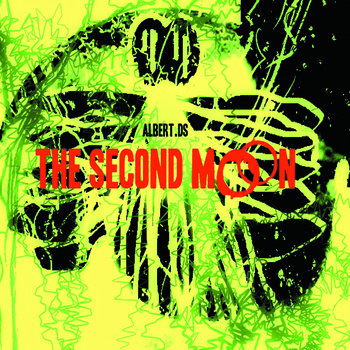After having a good few months to settle in, one of the lasting and better aspects of Albert DesSophy’s last album has come to reveal itself – the cohesiveness of it all. Listening again it sounds like it all came from the same place, like the origin was never out of focus. The electronics were consistently clean and precise with occasional electric guitar making for an undulating atmosphere through the album which matched its title, Across The Void. On his follow up, The Second Moon, a similar consistent sound doesn’t seem apparent as ten tracks offer a strange range of styles and experiments. Here we find acoustic songs next to vicious guitars driven ones which themselves sit next to strange tracks that have no definitive instrument at their core.
Take the opening trio of songs, which begin with “When The Daughter Awakes” which finds DesSophy taking a cue from his last album with a spattering of electronics and acoustic instruments over a looping drumbeat. It’s a strangely welcoming number that’s not too dissimilar to the sound on Void, if not a little more spread out and open-minded. But then comes “She Likes Jellyfishes/Ever Weirder Species” which trickles electric guitar notes and other noises over rambling spoken word verses which, unfortunately, ends up as awkward and weird sounding as that title suggests. And from this track the electrified beat and raucous guitar thrashing of “Savior” throws everything in the air again.
These tracks are just a fitting example but the majority of the album seems to come off as a variety pack of tracks with no musical core or sound running through them all. The only exception I can think of comes in the middle with “A Little Touch” and “Photon Burst,” the former acting as a settling introduction to the latter with its thick reverb running through it. But it’s “Photon Burst” which is the more interesting number here with its creepy repeating e-bow melody. However, the unsettling atmosphere kind of breaks when the guitar comes into the picture leaving me thinking it would sound more distinct with just the e-bow melody and DesSophy’s voice over it.
The better tracks from this selection that are worth mentioning for consistent quality are the two which finish off the album. “The Aftermath” starts off as an acoustic ballad – his most honest sounding one here – but throws the curveball in towards the end with an unexpected electric solo without jeopardizing any integrity the track spent minutes building up but instead successfully accentuating the heartache in the lyrics. While closing song “Air Chrysalis” sounds like it could have come from DesSophy’s last album with it buzzing synths and ticking beats, here it comes off as almost experimental with nothing else sounding both as “on” and as sinister. Just when the track builds up the tension it cuts away and you can’t help but wish for more but at the very least it leaves the listener wanting something else.
It’s tactics like these that are largely vacant from The Second Moon. The success of the tracks on Void came from the way they could both subtly and suddenly change the game by throwing in another element all while sounding completely considered. Here the majority of the tracks just drift by and don’t really feel like they’ve taken you anywhere or have given you anything to latch onto.
I realise from what I’ve said so far that the album comes off as hurried and unconsidered and while it does at times feel this way when tracks jump from one style to another, the concept and amount of extra material that comes with the album (extensive artwork, lyrics and five short stories) makes me think otherwise. Nonetheless, as much as I admire the work gone into the presentation of the album, it’s still undeniably scattershot at the best of times. There are good ideas here but they don’t stick around long or are overshadowed by other elements (that curious synth line that comes in just before the guitar on “Savior” and is lost thereafter or the strange rhythm at the end of “A Little Touch”). The organic sounds themselves are better sounding though with the electric guitar thankfully sounding cleaner and more overpowering than before and the microphone hiss pretty much eliminated entirely from the mix. The Radiohead influence is still there too (the “There There”-like intro of “Off (You’re Lost),” the way DesSophy holds his notes and the layout of the accompanying book). But really it just seems that DesSophy is himself a little lost and is trying to pinpoint an exact way to go. I don’t want to bash him for trying out new things but going by his superior last album, the results are much better when he appears to be in one place, even if that one place is a void.

